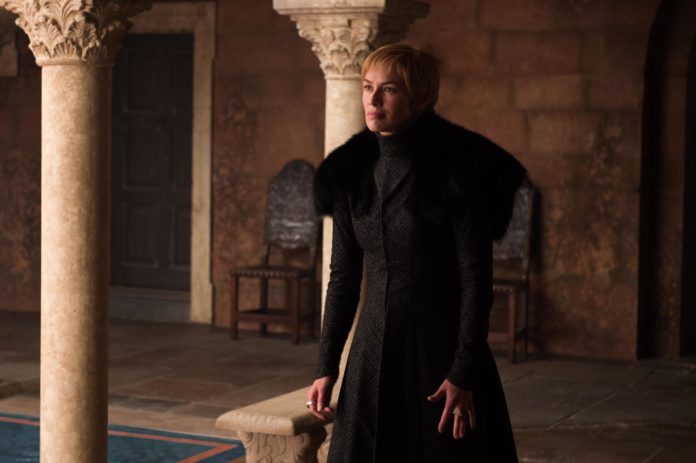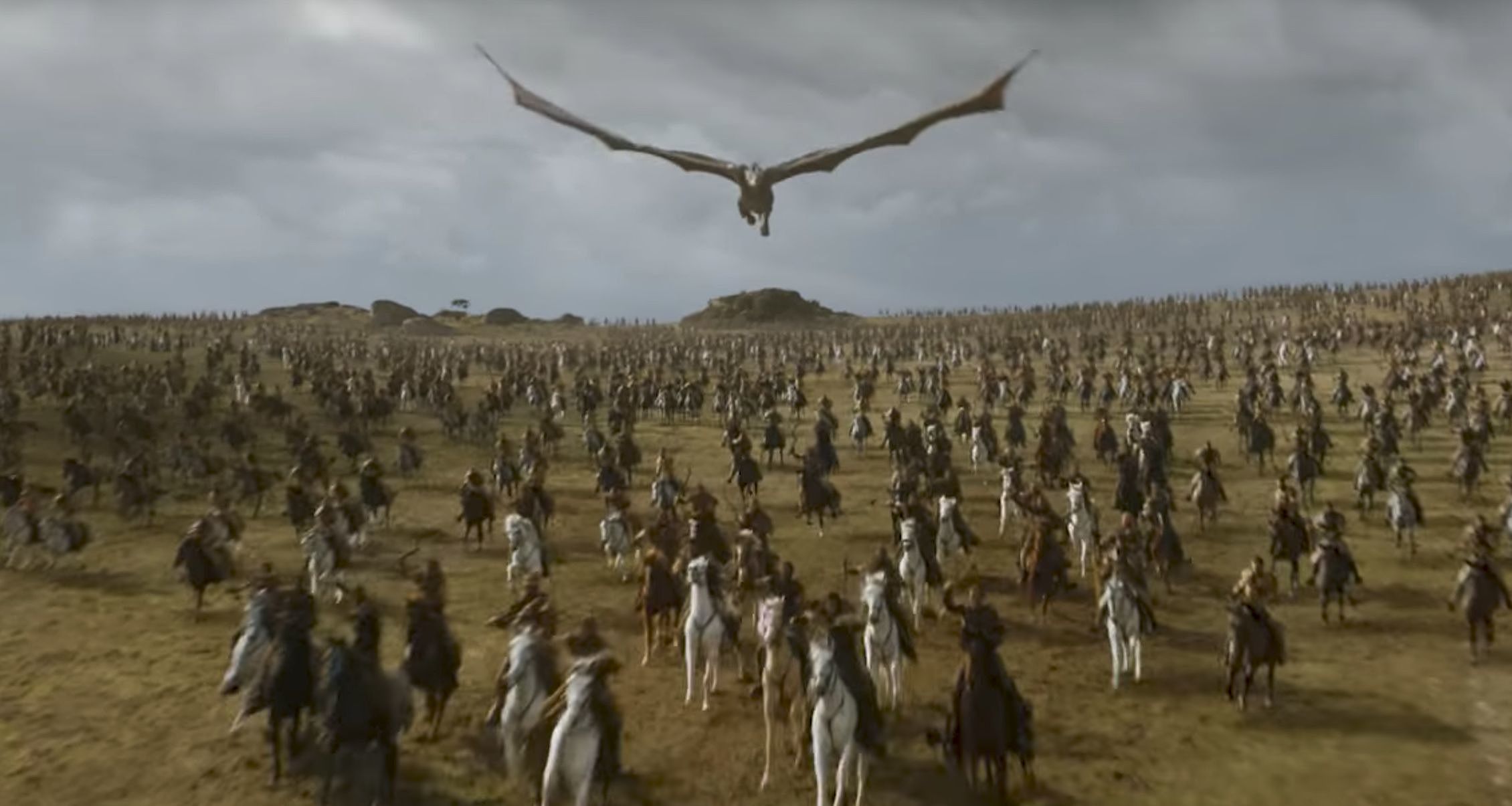Near the end of the Game of Thrones season 7 finale, Cersei Lannister smugly explained to her brother Jaime that she had engaged the services of the Golden Company, a group of mercenaries, to help her retake Westeros and, if need be, to defeat the combined forces of Daenerys Targaryen and Jon Snow, the King in the North. Now that Cersei has repaid the Crown’s debt to the Iron Bank, she has the financial backing she needs to make such a move. But what is the Golden Company, and will it have what it takes to prevail over the Unsullied, the Dothraki, the Northern armies and two dragons (assuming the Night King and Ice Viserion don’t get them first)? Here’s what we know about the Golden Company from the show:
The Golden Company is based in Essos and comprised of 20,000 sellswords and an unknown number of war elephants. It was first mentioned in season 4’s “Breaker of Chains,” when Ser Davos Seaworth suggested Stannis Baratheon commission the company to launch another assault on King’s Landing after Stannis’ army was decimated in the Battle of the Blackwater. Stannis initially scorned the idea of using sellswords, even though Davos assured him the Golden Company had never broken a contract.
The Golden Company was mentioned again in season 4 in “Mockingbird,” after Ser Jorah Mormont urged Daenerys not to trust Daario Naharis because of his affiliation with the Second Sons, another of Essos’ many sellsword companies. Daenerys reminded Jorah that he himself fought with the Golden Company before pledging his sword to her brother Viserys. The Second Sons’ captains were portrayed as ignoble louts, so perhaps Jorah’s disdain for that particular company was based in more than the fact that they were sellswords. As a highborn knight (albeit a disgraced and exiled one), Jorah may have opted to join the Golden Company because it was the least shady option in the inherently shady sellsword industry.
The Iron Bank has also used the Golden Company in the past to collect delinquent debts, as Tycho Nestoris informed Cersei in “The Spoils of War.” The Iron Bank is a staid institution that would be unlikely to partner with a disreputable enterprise, so that relationship, as well as Jorah’s stint with them, indicates the Golden Company is an effective and trustworthy entity (insofar as sellswords can be trustworthy) that will honor its contract and fight well for Cersei.
But will the Golden Company and what’s left of the Lannister army be enough to defeat the rest of Westeros if it has to? The Golden Company has 20,000 sellswords, which is probably comparable to what Jon and Dany have. There were originally 8,000 Unsullied, but it’s not clear how many are left after the casualties they incurred in Essos and at Casterly Rock. Their numbers still looked impressive when they were amassed outside King’s Landing in “The Dragon and the Wolf,” so the bulk of the Unsullied force is probably intact. The Dothraki appear to have significant numbers as well, and Jon estimated he had 2,000 men before the Battle of the Bastards. That was a pretty bloody battle, and many likely died. But then again, more Northern lords pledged themselves to Jon after the battle was over, and he also now has the Knights of the Vale on his side.
Both the Knights of the Vale and the Dothraki have horses, and horses have been a major factor in winning battles on Game of Thrones. Stannis’ mounted soldiers dominated Mance Rayder’s wildling army in “The Children,” the Knights of the Vale rode in and saved the day in “Battle of the Bastards,” and the Dothraki trampled over the Lannister line in “The Spoils of War.” But the Golden Company has elephants. Elephants have historically been used as war weapons because their superior size, strength and speed enables them to charge enemy lines, pulverizing anything in their path and terrorizing opposing armies. Horses would probably not be much of a match for elephants, but elephants will likely not be much of a match for dragons, assuming Daenerys’ remaining two don’t go down fighting the army of the dead. So the Golden Company’s elephants may not be a deciding factor in the war for Westeros.
Even if the elephants are able to do some damage and the Golden Company has superior numbers, is gold enough of a motivation to win a war? The Golden Company has a reputation for honoring its contracts, but in the end, fighting to uphold one end of a business transaction is not as compelling as fighting for an ideal, a better life, or the home and lands one has tended for generations. Tyrion, Missandei and Jon have all acknowledged that the people who choose to follow Dany do so because they believe she can create a better world. The Northern lords are deeply invested in protecting their ancestral homes and way of life. And, as Jaime observed after the Loot Train Attack, war is “sport” to the Dothraki. And the dragons just like to blow things up. The Golden Company’s payday seems like a meager incentive compared to the more profound reasons the Jon/Dany contingent has for entering the fray. While they may be worthy opponents, they don’t really have any skin in the game.
Then again, depending on how faithfully the show adapts the Golden Company from George R.R. Martin’s novels, they may have more incentive than most sellswords. In the Song of Ice and Fire books, the Golden Company was founded by Aegor Rivers, known as Bittersteel, a legitimized bastard of King Aegon IV Targaryen. Bittersteel fled across the Narrow Sea after mounting a failed rebellion against the Iron Throne, and put together the Golden Company from the ranks of other Westerosi exiles. Even generations later, the company prefers to think of itself as a free brotherhood of exiles rather than as sellswords, which may explain why Jorah Mormont, himself a Westerosi exile, was attracted to it.
And because they think of themselves as exiles, they have a higher purpose than profit: they want to go home. In the books, they join up with the new Aegon VI Targaryen, also known as Young Griff, during his invasion of Westeros. Young Griff doesn’t appear on the show, but if Cersei can offer the men of the Golden Company a return to their homeland in addition to payment, they may fight all the more fiercely.
But we don’t know if the show will include these aspects. Going purely off what we know of the Golden Company from the screen, a company of foreign mercenaries probably won’t win Westeros for Cersei in the end, however nakedly she lusts for power. As Cersei herself warned Ned Stark, “when you play the game of thrones, you win or you die.” It’s time for her to die. Bring on the Valonqar!
To stay up to date on everything Game of Thrones, follow our all-encompassing Facebook page and sign up for our exclusive newsletter.
Watch Game of Thrones for FREE with a no-risk, 7-day free trial of Amazon Channels.




















![[Book Review] The Blade Itself (The First Law Trilogy) by Joe Abercrombie](https://bendthekneegot.com/wp-content/uploads/2018/01/1516047103_maxresdefault-218x150.jpg)


















